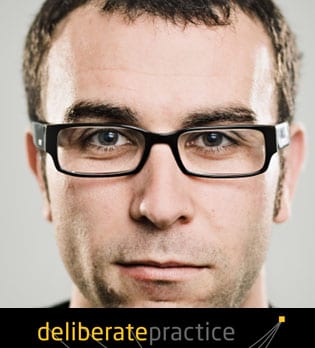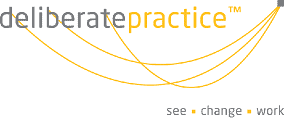The real meaning of isolation, meaningful career conversations, and new horizons in 2022
The latest Omicron surge left me screaming into the abyss (well, not literally) as I lay in isolation in a COVID ward at Melbourne’s RMH, gasping for a breath and fighting a relentless fever. With attentive medical care and specialised treatment, my recovery was swift, and I managed to avoid a trip to the ICU.
This short and rather dramatic stay in hospital brought home the real meaning of isolation. I’d already spent a couple of years working from home, rarely seeing deliberatepractice colleagues or clients, and I had experienced the odd stint isolating due to a close contact.
However, isolating in hospital in a negative pressure environment has an eerie silence to it, with layers of glass walls between me and the medical team, and those who were given access to my room, donned in surgical masks, gloves, goggles, glasses, face shields, gowns, and aprons. Adjacent, another airlock room for the medical team to change into or out of their protective clothing, a further measure of distance I can’t imagine what it must be like isolating in an ICU.
To say our healthcare workers are amazing, and their workload barely manageable is an understatement. However, many health care workers in Melbourne have been forced to leave their jobs due to long COVID, are working while sick, or have chosen to leave for other reasons.
The Careers focused part of my mind couldn’t help but think: this industry may struggle to retain their workforce, despite the resilience demonstrated. There are many stories floating around about nurses leaving a profession that they thought they never would, and potentially a bigger exodus.
I can’t imagine the challenges associated with trying to get people better, striving for those wins, and COVID-19 upsetting that balance. Even experienced people are confronted with the worst conditions they have ever faced, unimaginable workloads, and already difficult jobs becoming unbearable. The burnout is real. As I learned from one nurse just how many staff they were losing, I began reflecting on COVID-19, what it had meant for careers in general, for leading people, for career growth or setbacks, and forced change.
With hours on my hand, my mind meandered. I thought about how we’d reached a stage of the pandemic where trying to describe our lot has an absurdity about it, whether related to celebrity fiascos, borders and lockdowns, staggering economic trade-offs, conspiracy theories, social distancing, digital disgrace or “parenting on the edge”. The greatest absurdity, perhaps being, where my mind was taking me when I was literally only a mini-second away from being carted to the ICU if things didn’t turn.
Managing careers during a pandemic
Lying in hospital, I realised that I’ve had it quite easy. My kids are older and independent, so I’m not personally faced with the potential skyrocketing case counts in schools and potential for schools to shut.
The ever-looming idea puts many on edge thinking about teacher shortages and maintaining meaningful career development while also home schooling.
I marvelled at today’s kids. Their displays of resilience and sacrifice, and the impact this must have had on parents, whose job it is to be resilient for them and spare them from our worries and fears. We’re supposed to keep them focusing on schooling at home AND juggle a career at the same time. No mean feat.
Having older kids, I witnessed their resilience as they adapted to university online and a lack of socialisation, dating or networking opportunities that should accompany young adults as they transition from secondary school to university, into part time or temporary employment and into career jobs.
Reflecting on recent conversations
Managing a career during COVID-19 has had its challenges. Lockdowns have impacted routines, productivity, training and career plans, and psychological wellbeing.
You may be a university student, navigating your studies without the enriching life that a campus environment offers. Or a member of a team, no longer able to maintain a meaningful connection to your work without the social interactions of a workplace to ignite your creativity and create a space for social interaction.
You may be a parent juggling working from home with home schooling, with limited bandwidth to engage in work fully.
Perhaps you haven’t been able to keep your career on track as training and career plans have been disrupted and expected productivity lowered; maybe you’ve lost a meaningful connection with your manager or mentor since working from home.
You may work in a flourishing industry where your career has taken off. Or you may have reset your priorities, having worked a relentless pace and no longer experiencing joy from your job.
Your definition of fulfilling work may have changed during the pandemic or you made a brave move that is not working out quite as you had hoped.
Wherever you are in your journey, it’s never too late to take the time to reflect on your career. This is essential for effective career management and a meaningful conversation with a career expert, may just be one of the best things you can do for yourself.
Meaningful career conversations: Tips for career and professional development
1. If you have no bandwidth:
Prioritise taking breaks, taking care of yourself and loved ones. It’s ok to do this.
Sometimes just talking to an independent Career Coach helps as you can chat about what’s going on for you, what’s on your mind, and strategies to get you back on track. You may only require one or two sessions.
2. If bandwidth permits:
Take time to reflect and articulate your vision, whether that is an academic route, career exploration, career planning or job search. A Career Coach can help structure your thinking and move you towards your goals which may include modifying your career strategy.
This narrative approach provides the platform to strategize effectively and help you to assess your career options.
3. Having trouble navigating productivity?
Whether in your own work or in managing others, it’s important to find someone to talk to. That might be a mentor, your manager, a peer, your HR person or Career Coach
The idea is that you can discuss your issues or practice to prepare to have a conversation with your manager. It’s important to check in with your manager about any support needed in achieving reasonable productivity expectations during COVID quarantines.
It really helps to talk about this, and our Career Coaches can help prepare you to have a conversation with your manager
4. Keep growing.
Identify how you’d like to grow and stay focused on your goal. Answer questions like:
- What do I want my next job to be?
- What skills will I need to develop or strengthen?
- What experience will I need to gain?
- What connections will be helpful to cultivate before making my next move?
Set up a meeting with your manager to discuss your career and start an open dialogue, especially if worried that it is stalling. But keep your expectations realistic.
Simultaneously, there are things you can do to help your own career:
- Volunteer for stretch assignments related to your career goals
- Pitch ideas to improve your current organisation
- Identify solutions to problems that you see.
- Cultivate your network at work and strengthen connections with your team
- Attend virtual networking events using breakout features to interact and meet people
- Find a career mentor who can provide insight into your field and give you advice
There are endless online courses to strengthen your skills or learn new ones. You can also tend to your self-development through books, podcasts, YouTube videos or in other ways that work for you.
5. Supervising during periods of uncertainty can be daunting.
If you manage others and find remote leadership hard, figuring out the best way to navigate your own situation while also being an effective leader for your team can be stressful.
It’s important to make decisions in line with your values. If you embody your core values in 1:1 time with a staff member, this can help you cope.
You don’t need to solve their problems or have all the answers. But you must be present, assess their productivity and morale, and focus on helping them move forward (even if progress is slow). Be empathetic and compassionate while also being professional and keeping your team productive.
Consider whether you need to reset expectations of how you continue to work together; what needs to change or stop. Think about:
- How often you check in
- How engagement and culture interact
- How you give regular actionable feedback
- Whether a Coach can support you as a leader
- How often you can meet or connect remotely
Keeping your team member engaged with new sets of tasks or by redesigning goals, and having meaningful conversations about what support they need, can help to maintain enthusiasm.
6. Reinventing your career
Many Melbournians are rethinking their careers. Often threatening situations like a pandemic prompt, us to behave conservatively, the opposite of what is required when we’re considering a career change. It’s hard to dive wholeheartedly into reinventing your career if you are feeling risk averse or worried about your prospects.
But if you have a growing urge to do something new, even after this crisis has subsided but don’t know what that is, then let yourself imagine. You may find that by working with a Career Coach you can experiment, evaluate, and learn about a range of possibilities.
Don’t go it alone. You must exist betwixt and between a past that is clearly gone and a future that is still uncertain. It’s easy to lose your bearings and oscillate between holding on and letting go.
Even if you can’t really get moving on this right now, a common path to a career reinvention involves doing something on the side where you cultivate knowledge, skills, resources and relationships until you’ve got strong new legs to walk on in exploring a new career.
So, get going. Find projects you’re passionate about, work your dormant ties, do some pro bono or advisory work and develop start-up ideas. Reallocate time and talk it out with a Career Coach or loved one. Self-reflection paradoxically is a practice best nourished by talking out loud with kindred spirits.
Now is the time for meaningful career conversations
I don’t know about you, but 2021 started to feel like Groundhog Day for myself and the deliberatepractice team. In 2020 I had great moments of inspiration and stretch, found new creativity, and adapted to extraordinary change. It was quite novel at first and energising in a bizarre way. Then it lost its shine. 2021 showed early promise but our hopes were quickly dashed with a new variant and sustained lockdowns.
2022 has well and truly arrived with a bang and despite many challenges still with us, the new year is stretching out gloriously in front of us, with endless possibilities and potential to make it a wonderful year.
With some laser focus, effort and practice, meaningful career conversations and preparedness to make tough decisions, 2022 can turn into the year that you want it to be on many fronts.
A fundamental driver should be high regard for the ways career and life intercept with your happiness.
I wish you all the very best.
If you would like a free preliminary chat with a Melbourne HR consultant or Career Coach, please do not hesitate to contact deliberatepractice.



